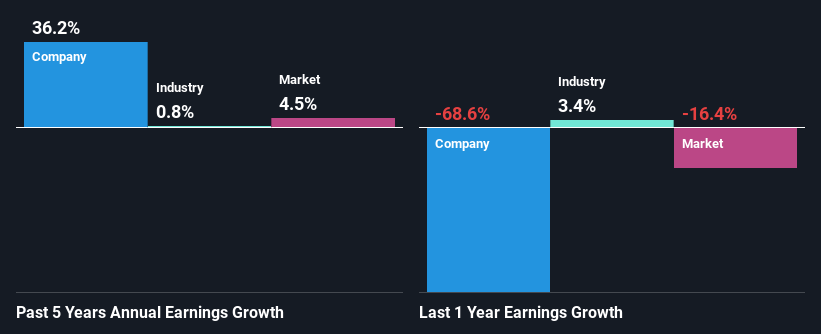Are Genesis Energy Limited's (NZSE:GNE) Mixed Financials The Reason For Its Gloomy Performance on The Stock Market?
With its stock down 2.8% over the past three months, it is easy to disregard Genesis Energy (NZSE:GNE). It seems that the market might have completely ignored the positive aspects of the company's fundamentals and decided to weigh-in more on the negative aspects. Stock prices are usually driven by a company’s financial performance over the long term, and therefore we decided to pay more attention to the company's financial performance. Specifically, we decided to study Genesis Energy's ROE in this article.
ROE or return on equity is a useful tool to assess how effectively a company can generate returns on the investment it received from its shareholders. Put another way, it reveals the company's success at turning shareholder investments into profits.
Check out our latest analysis for Genesis Energy
How Do You Calculate Return On Equity?
Return on equity can be calculated by using the formula:
Return on Equity = Net Profit (from continuing operations) ÷ Shareholders' Equity
So, based on the above formula, the ROE for Genesis Energy is:
3.6% = NZ$89m ÷ NZ$2.5b (Based on the trailing twelve months to December 2023).
The 'return' refers to a company's earnings over the last year. So, this means that for every NZ$1 of its shareholder's investments, the company generates a profit of NZ$0.04.
Why Is ROE Important For Earnings Growth?
We have already established that ROE serves as an efficient profit-generating gauge for a company's future earnings. Depending on how much of these profits the company reinvests or "retains", and how effectively it does so, we are then able to assess a company’s earnings growth potential. Generally speaking, other things being equal, firms with a high return on equity and profit retention, have a higher growth rate than firms that don’t share these attributes.
Genesis Energy's Earnings Growth And 3.6% ROE
It is quite clear that Genesis Energy's ROE is rather low. Not just that, even compared to the industry average of 8.7%, the company's ROE is entirely unremarkable. However, we we're pleasantly surprised to see that Genesis Energy grew its net income at a significant rate of 36% in the last five years. We believe that there might be other aspects that are positively influencing the company's earnings growth. For instance, the company has a low payout ratio or is being managed efficiently.
We then compared Genesis Energy's net income growth with the industry and we're pleased to see that the company's growth figure is higher when compared with the industry which has a growth rate of 0.8% in the same 5-year period.
Earnings growth is an important metric to consider when valuing a stock. The investor should try to establish if the expected growth or decline in earnings, whichever the case may be, is priced in. This then helps them determine if the stock is placed for a bright or bleak future. One good indicator of expected earnings growth is the P/E ratio which determines the price the market is willing to pay for a stock based on its earnings prospects. So, you may want to check if Genesis Energy is trading on a high P/E or a low P/E, relative to its industry.
Is Genesis Energy Using Its Retained Earnings Effectively?
Genesis Energy has very a high three-year median payout ratio of 128% suggesting that the company's shareholders are getting paid from more than just the company's earnings. In spite of this, the company was able to grow its earnings significantly, as we saw above. With that said, it could be worth keeping an eye on the high payout ratio as that's a huge risk. You can see the 4 risks we have identified for Genesis Energy by visiting our risks dashboard for free on our platform here.
Besides, Genesis Energy has been paying dividends for at least ten years or more. This shows that the company is committed to sharing profits with its shareholders. Based on the latest analysts' estimates, we found that the company's future payout ratio over the next three years is expected to hold steady at 106%. Regardless, the future ROE for Genesis Energy is predicted to rise to 6.3% despite there being not much change expected in its payout ratio.
Conclusion
Overall, we have mixed feelings about Genesis Energy. While the company has posted impressive earnings growth, its poor ROE and low earnings retention makes us doubtful if that growth could continue, if by any chance the business is faced with any sort of risk. With that said, the latest industry analyst forecasts reveal that the company's earnings growth is expected to slow down. Are these analysts expectations based on the broad expectations for the industry, or on the company's fundamentals? Click here to be taken to our analyst's forecasts page for the company.
Have feedback on this article? Concerned about the content? Get in touch with us directly. Alternatively, email editorial-team (at) simplywallst.com.
This article by Simply Wall St is general in nature. We provide commentary based on historical data and analyst forecasts only using an unbiased methodology and our articles are not intended to be financial advice. It does not constitute a recommendation to buy or sell any stock, and does not take account of your objectives, or your financial situation. We aim to bring you long-term focused analysis driven by fundamental data. Note that our analysis may not factor in the latest price-sensitive company announcements or qualitative material. Simply Wall St has no position in any stocks mentioned.

 Yahoo Finance
Yahoo Finance 
